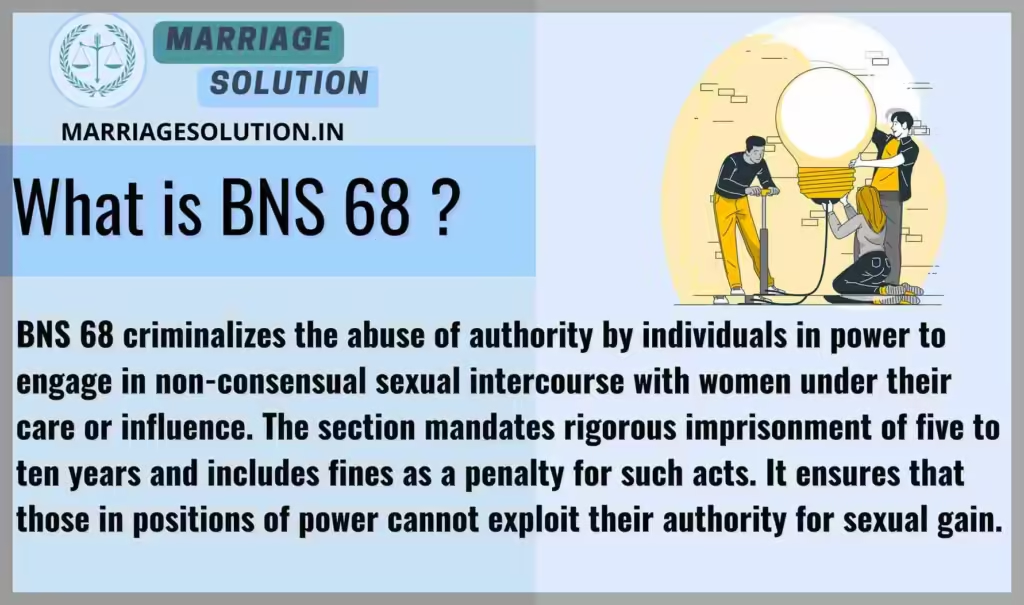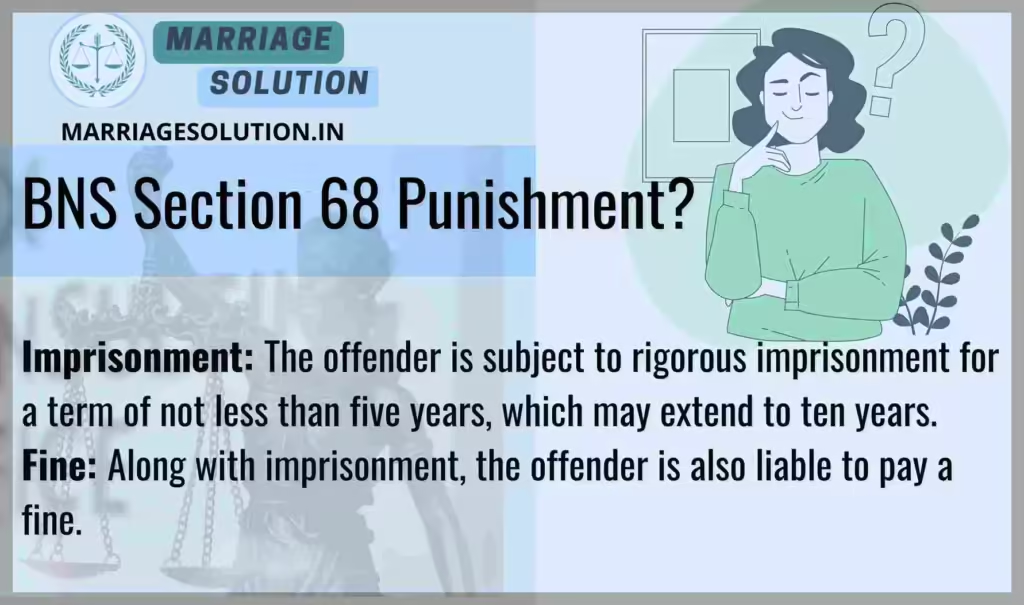Introduction of BNS 68
BNS 68 is a legal provision that targets the misuse of authority to engage in non-consensual sexual acts. This section specifically applies to individuals in positions of power, such as public servants, superintendents of institutions, or those managing hospitals, who abuse their authority to induce or seduce women into sexual acts that do not amount to rape. The law aims to protect vulnerable individuals from exploitation by those who hold power over them.
The Bharatiya Nyaya Sanhita (BNS) Section 68 replaces the old Indian Penal Code (IPC) Section 376C .
What is section 68 of BNS ?
BNS 68 criminalizes the abuse of authority by individuals in power to engage in non-consensual sexual intercourse with women under their care or influence. The section mandates rigorous imprisonment of five to ten years and includes fines as a penalty for such acts. It ensures that those in positions of power cannot exploit their authority for sexual gain.

Bharatiya Nyaya Sanhita Section 68
When a person in a position of authority, such as a public servant, superintendent of a jail, hospital staff, or caretaker in an institution, abuses their power to have sexual intercourse with a woman under their charge, custody, or care—without her free consent—it constitutes an offence. The act may not amount to rape in strict legal terms, but it is punishable as sexual exploitation through abuse of authority.
(This provision corresponds to IPC Section 376C, updated under the Bharatiya Nyaya Sanhita (BNS), 2023.)
1. Meaning of Section 68
BNS Section 68 criminalizes the misuse of power by individuals in authority who exploit women under their care or supervision for sexual intercourse. The law recognizes that such “consent” obtained through pressure, manipulation, or authority is not real consent.
2. Purpose of Section 68
The objective is to protect women in vulnerable situations—such as patients in hospitals, inmates in jails, or students in institutions—from being exploited by those who hold power over them. This section ensures accountability of authority figures and reinforces the principle that no position grants immunity from the law.
3. Essential Ingredients of Section 68
For this offence to apply, the following conditions must exist:
- Position of Authority – The accused must be a public servant, jail superintendent, hospital staff, caretaker, teacher, or someone in lawful charge.
- Abuse of Power – Sexual intercourse must occur by taking advantage of such authority.
- Lack of Free Consent – Even if the woman appears to consent, if it is obtained under fear, undue influence, or misuse of position, it is invalid.
- Nature of Act – The act need not amount to rape under Section 64 BNS, but it is still punishable under this section.
4. Punishment under BNS Section 68
- Imprisonment – Rigorous imprisonment for not less than 5 years, extendable to 10 years.
- Fine – The offender is also liable to pay a fine.
5. Examples of Section 68 in Action
- Example 1: A jail superintendent forces a female inmate into sexual intercourse, threatening withdrawal of privileges. This is punishable under Section 68.
- Example 2: A doctor in a government hospital exploits a female patient by assuring better treatment in exchange for sexual favours. This is covered under Section 68.
- Counter-Example: A consensual relationship between two adults where no misuse of authority exists does not fall under this section.
6. Cognizable, Non-Bailable, and Triable by Court of Session
- Cognizable – Police can arrest without a warrant.
- Non-Bailable – Bail is not a matter of right.
- Court of Session – The case is tried by a Sessions Court.
7. Importance of Section 68
BNS Section 68 is a safeguard for women against sexual exploitation in environments where they are dependent on those in authority. It reinforces the message that power cannot be misused for sexual gain, ensuring strict legal consequences for offenders.
Section 68 BNS explained
BNS Section 68 deals with the misuse of authority by individuals in power who exploit their positions to engage in non-consensual sexual acts with women under their care or influence. This section aims to protect women from being taken advantage of by those in positions of trust, such as public servants, hospital staff, or superintendents of institutions.
BNS 68: 10 Key Points Explained
1. Scope of the Law
This section applies to people who hold official authority or control over women, including public servants, police officers, jail superintendents, hospital staff, teachers, and caretakers in women’s or children’s institutions. The law specifically recognizes that women in these settings are vulnerable and deserve strong legal protection.
2. Abuse of Authority
The central focus of this section is abuse of power. If someone uses their official authority or fiduciary position (where trust and care are expected) to exploit a woman, it becomes a punishable offence. For example, if a hospital doctor exploits a patient or a jail warden exploits a woman inmate, the law treats it as abuse of authority.
3. Non-Consensual Acts
The section makes it clear that even if the act does not fit the strict legal definition of rape, it can still be criminal. This is because “consent” obtained through fear, manipulation, or misuse of authority is not true consent. The law recognizes this as sexual exploitation, not a valid agreement.
4. Punishment – Imprisonment
The punishment for offenders is rigorous imprisonment for a minimum of 5 years, which may extend up to 10 years. This ensures that such crimes are taken very seriously and carry strong consequences.
5. Punishment – Fine
Along with imprisonment, the offender must also pay a fine. The fine serves both as an added punishment and as a deterrent against other authority figures who may consider misusing their power.
6. Explanation of Terms
To avoid loopholes, the law provides detailed definitions of important terms like “sexual intercourse,” “superintendent,” and “hospital.” This ensures that a wide range of exploitative situations are covered and offenders cannot escape due to vague wording.
7. Cognizable Offense
The offence is cognizable, meaning the police can register a case and arrest the accused without a warrant. This empowers law enforcement to act quickly and prevent further exploitation.
8. Non-Bailable Offense
The offence is non-bailable, which means the accused does not have an automatic right to bail. They must convince the court, and bail is usually denied in such serious matters, ensuring that victims remain safe and justice is not obstructed.
9. Triable by Court of Session
Cases under this section are tried in a Sessions Court, which handles serious criminal offences. This ensures that the matter is taken up by a court with the authority to deliver strict punishments.
10. Protection of Vulnerable Groups
The core objective of Section 68 is to protect women in vulnerable environments—such as hospitals, prisons, shelters, schools, or institutions—where they may be dependent on those in authority. It reinforces the principle that no person, regardless of position, is above the law, and that misuse of authority for sexual exploitation will be severely punished.
Section 68 BNS Punishment
Imprisonment: The offender is subject to rigorous imprisonment for a term of not less than five years, which may extend to ten years.
Fine: Along with imprisonment, the offender is also liable to pay a fine.

Section 68 BNS bailable or not ?
BNS Section 68 is non-bailable, meaning the accused cannot be released on bail as a matter of right.
Comparison: BNS Section 68 vs IPC Section 376C
| Section | Offence | Punishment | Bailable / Non-Bailable | Cognizable / Non-Cognizable | Trial By |
|---|---|---|---|---|---|
| BNS Section 68 | Sexual intercourse by a person in authority, including public servants, jail/hospital staff, superintendents, teachers, or caretakers, exploiting women under their charge without valid consent. | Rigorous imprisonment not less than 5 years, may extend to 10 years; and fine. | Non-Bailable | Cognizable | Court of Session |
| IPC Section 376C (Old) | Sexual intercourse by a person in authority (e.g., public servant, jail superintendent, hospital staff) with a woman under his charge, not amounting to rape. | Rigorous imprisonment not less than 5 years, may extend to 10 years; and fine. | Non-Bailable | Cognizable | Court of Session |
BNS Section 68 FAQs
Who does BNS Section 68 apply to?
It applies to individuals in positions of authority, such as public servants, jail superintendents, and hospital staff.
What is the maximum punishment under this section?
The maximum punishment is ten years of rigorous imprisonment.
What is the minimum punishment under Section 68?
The minimum punishment is five years of rigorous imprisonment.
Is the offense bailable?
No, the offense is non-bailable, reflecting its seriousness.
Which court handles cases under Section 68?
The case is triable by a Court of Session.
Conclusion
BNS Section 68 reflects India’s progressive approach in redefining offences that were earlier covered under IPC 376C. This section emphasizes consent, accountability, and strict punishment in cases where individuals in positions of authority misuse their power for sexual exploitation. By shifting from IPC to BNS, the law provides more clarity and ensures better protection of victims. Understanding BNS 68 is essential for students, lawyers, and anyone interested in knowing how the new Bharatiya Nyaya Sanhita addresses sexual crimes in India.
Need Legal Support?
If you are dealing with court cases, marriage problems, or any other legal issue, our team at Marriage Solution – Lawyer Help is here for you. Simply fill out our quick online enquiry form, and we’ll connect you with the right legal expert to support your needs.
Finished with BNS 68 ? Continue exploring the next provisions of the Bharatiya Nyaya Sanhita (BNS), 2023. Each section includes explanations, examples, and plain-language breakdowns for easy understanding.
- BNS Section 69 : Sexual intercourse by a person in authority.
- https://marriagesolution.in/bns_section/section-69-bns/
- BNS Section 70 : Gang rape .
- https://marriagesolution.in/bns_section/bns-70/
- BNS Section 71 : Punishment for repeat offenders .
- https://marriagesolution.in/bns_section/bns-71/
- BNS Section 72 : Disclosure of identity of the victim of certain offences, etc .
- https://marriagesolution.in/bns_section/bns-section-72/
- BNS Section 73 : Printing or publishing any matter relating to Court proceedings without permission.
- https://marriagesolution.in/bns_section/bns-section-73/
Full IPC Section List: https://marriagesolution.in/ipc-section-list
All Indian Law & Blogs: https://marriagesolution.in/indian-law/
Full BNSS Section List: https://marriagesolution.in/bnss_section-list
